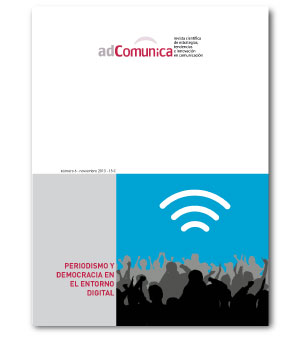¿Participación y democracia en los medios sociales?: El caso de Twitter en las elecciones vascas de 2012
##plugins.themes.bootstrap3.article.main##
Resum
Al incorporarse a la política española, Twitter prometía revitalizar la relación gobernantes-gobernados y dinamizar el debate político en el marco de la política 2.0, unas expectativas que, según demuestra este trabajo, no se materializaron en el caso de la campaña de las elecciones autonómicas vascas de 2012. En concreto, el artículo analiza la actividad en las cuentas de los principales candidatos en estos comicios —@iurkullu, @lauramintegui, @patxilopez y @basagoiti— identificando el tipo de mensajes, su origen, su intencionalidad y los grados de interacción e hipertextualidad que presentan. Las conclusiones evidencian que en esta campaña Twitter no fue, en los casos analizados, un instrumento de política 2.0: la actividad es baja; el diálogo gobernantes gobernados no existe, por ser las conversaciones puntuales, de escasa profundidad y mala calidad, y no se desarrolla el potencial hipertextual de la herramienta, ya que lo más frecuente es que los tuits no incluyan enlace alguno. El trabajo no ha encontrado creación de opinión, ni discusión ni divulgación de material diferente a la campaña tradicional, y sí en cambio un apoyo a esta cercano al broadcasting de los medios tradicionales. Las diferencias encontradas entre los cuatro candidatos analizados no se explican por parámetros ideológicos o territoriales sino que responden a las diferentes tácticas de campaña tradicional, sin una estrategia diferenciada en política 2.0.
Descàrregues
##plugins.themes.bootstrap3.article.details##
1. Política propuesta para Revistas que ofrecen Acceso Abierto
Los autores que publican en esta revista están de acuerdo con los siguientes términos:
- Los autores conservan los derechos de autor y garantizan a la revista el derecho de ser la primera publicación del trabajo al igual que licenciado bajo la licencia CC BY-SA, que permite a otros compartir el trabajo con un reconocimiento de la autoría del trabajo y la publicación inicial en esta revista.
- Los autores pueden establecer por separado acuerdos adicionales para la distribución no exclusiva de la versión de la obra publicada en la revista (por ejemplo, situarlo en un repositorio institucional o publicarlo en un libro), con un reconocimiento de su publicación inicial en esta revista.


